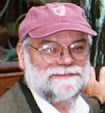[Originally written for the St. Mary's (Painesville, Ohio) church bulletin]
Does
everyone have a responsibility to build a Just World? What if you are too busy,
too young, too old, too sick?
Catholic Christians (and those of many other faiths) believe everyone has a responsibility and a
role. For some people, the role is to try to shape policy, by way of
participation in politics or agencies that make policy. And of course all
adult citizens have the right (and responsibility) to vote! But not every
person can shape policy, and some people are not eligible to vote.
If you are too young, say an infant and or a child, your role is
to be that very baby or child. Learn to understand the world, learn about love
from your parents and family.
If you are a busy young parent, your role in bringing about the
Just Kingdom is to raise healthy, happy, well-adjusted children. You will teach
them love, justice, and service. You will teach both by your words and your example.
If you are too old or too sick for active work, pray for the
world. Remember that every time we pray the Our Father we are asking for the
Lord's Kingdom to be established and we are asking for forgiveness, for ourselves,
and for our enemies. That is a huge contribution to building the Beloved
Community.
If you have been blessed with time and energy, you can do what
some of your St. Mary parishioners and friends do: chop onions and carrots (or
do a dozen other jobs) for St. Mary's Wednesday and Thursday night meal for the
homeless and hungry; go to daily mass and pray for the world (and then maybe
serve food and beverages at St. Mary's
meal); take communion and comfort to the sick and homebound; staff St. Mary’s
food pantry for the hungry; visit prisoners in the county jail (several of your
fellow parishioners do that); play liturgical music and prepare luncheons for
the grieving at funerals--your neighbors do that; help immigrants adjust to
life in America--that's a central ministry of St. Mary's. There is so much to
do--and so few workers in the vineyard.
You build justice by living out the Spiritual and Corporal Works
of Mercy (see Matthew 25:34-40), central elements of Christianity, and a
particular focus of Catholicism. These are right there in the Gospels, and part
of the mission of our own parish. Everyone has a role; it can be very modest,
but that doesn't matter.
Get out there and do something!
[The above essay was written for a particular church (and its ministries). But I think these ideas can be generalized far beyond St. Mary's! I myself am so honored to be an active participant in some of these ministries.]
Below is part of Wikipedia's entry on "Works of Mercy":
The Seven Corporal Works of Mercy
Corporal Works of Mercy are those that tend to bodily needs of others. In Matthew 25:34-40, in the The Judgment of Nations, six specific Works of Mercy are enumerated, although not this precise list — as the reason for the salvation of the saved, and the omission of them as the reason for damnation. The last work of mercy, burying the dead, comes from the Book of Tobit.
- To feed the hungry.
- To give drink to the thirsty.
- To clothe the naked.
- To harbour the harbourless. (also loosely interpreted today as To Shelter the Homeless)
- To visit the sick.
- To visit the imprisoned (classical term is "To ransom the captive")
- To bury the dead.
The Seven Spiritual Works of Mercy
Just as the Corporal Works of Mercy are directed towards relieving corporeal suffering, the even more important aim of the Spiritual Works of Mercy is to relieve spiritual suffering. The latter works are traditionally enumerated thus:
- To instruct the ignorant.
- To counsel the doubtful.
- To admonish sinners.
- To bear wrongs patiently.
- To forgive offences willingly.
- To comfort the afflicted.
- To pray for the living and the dead.


No comments:
Post a Comment